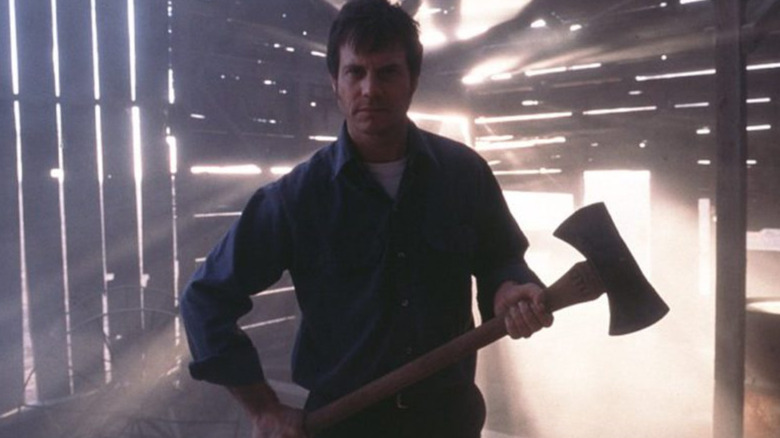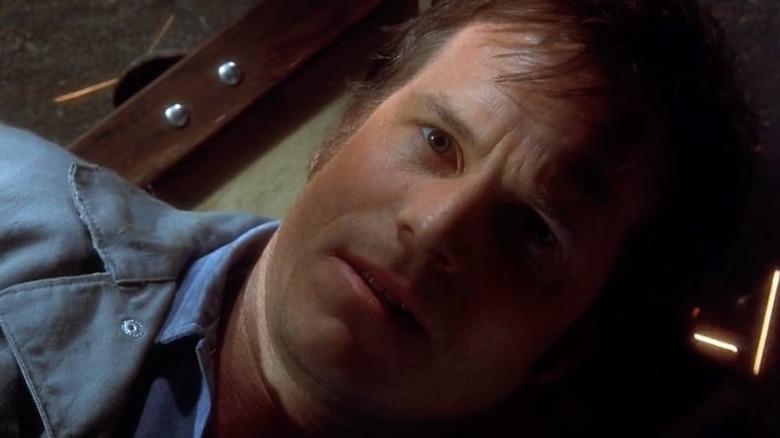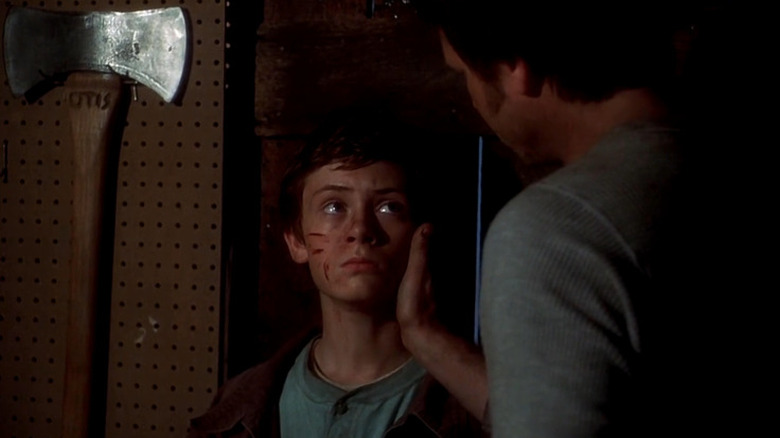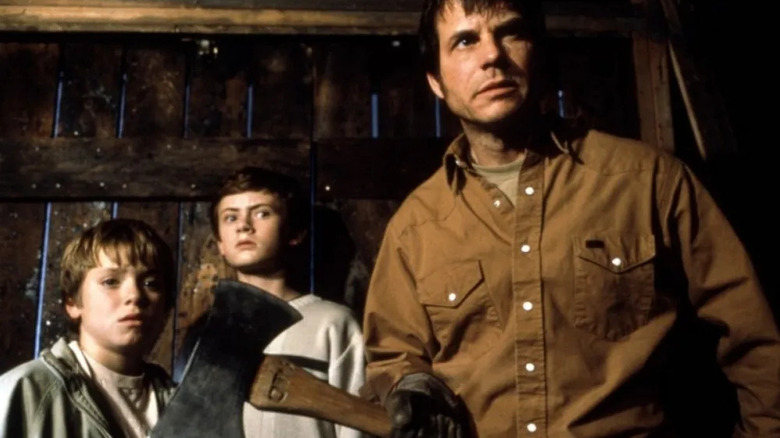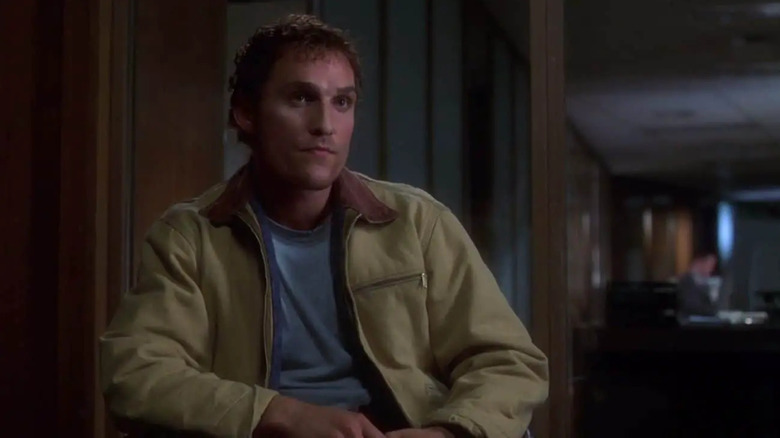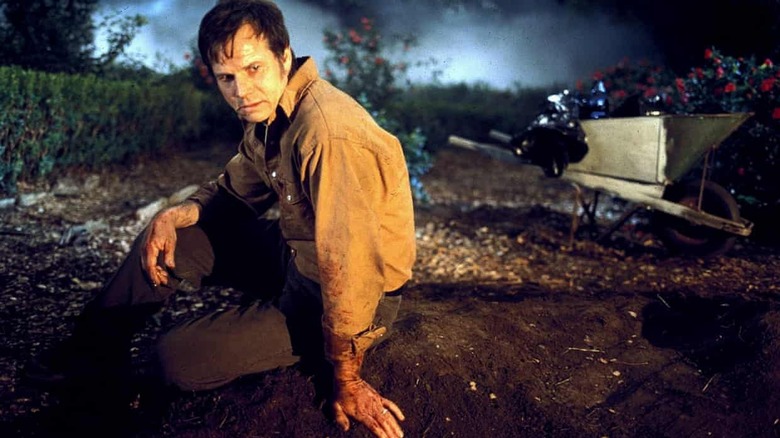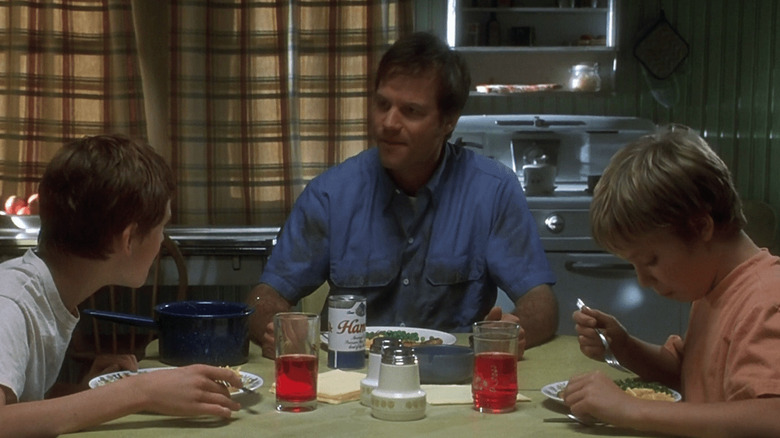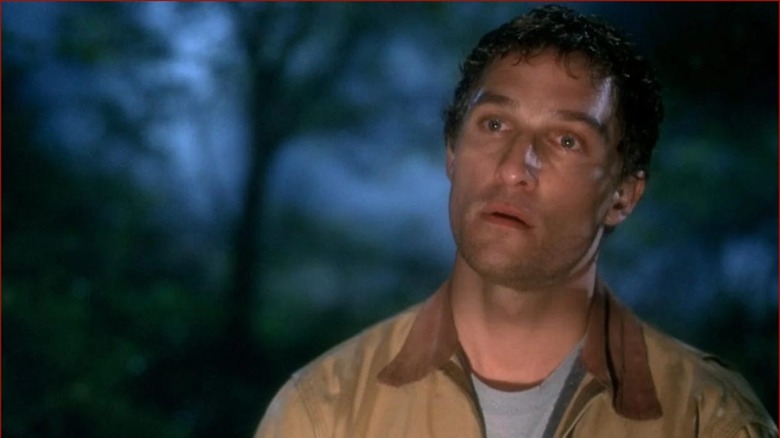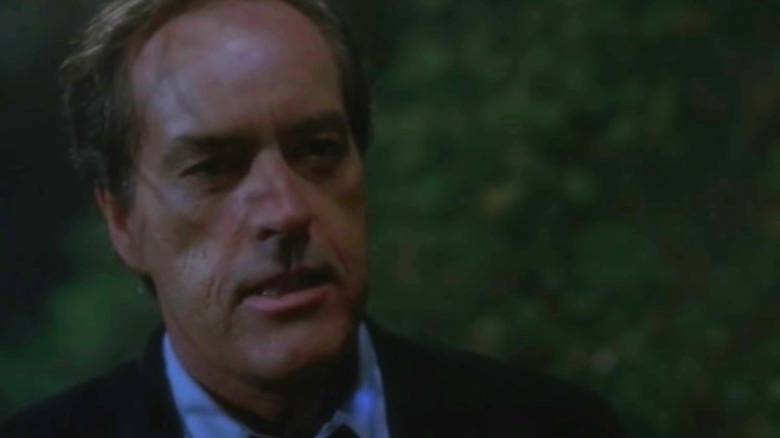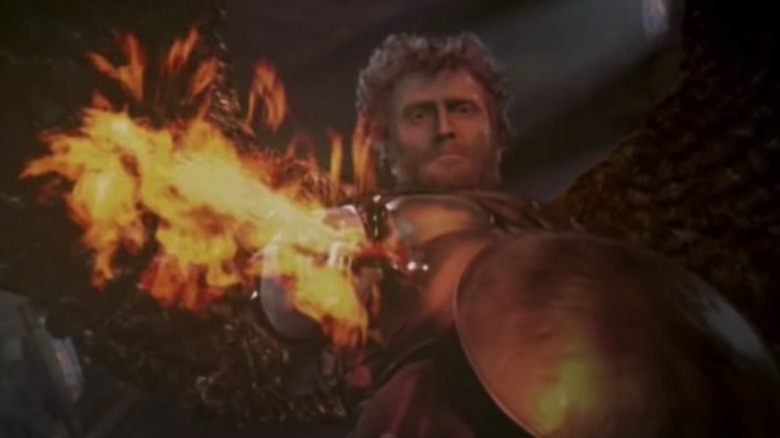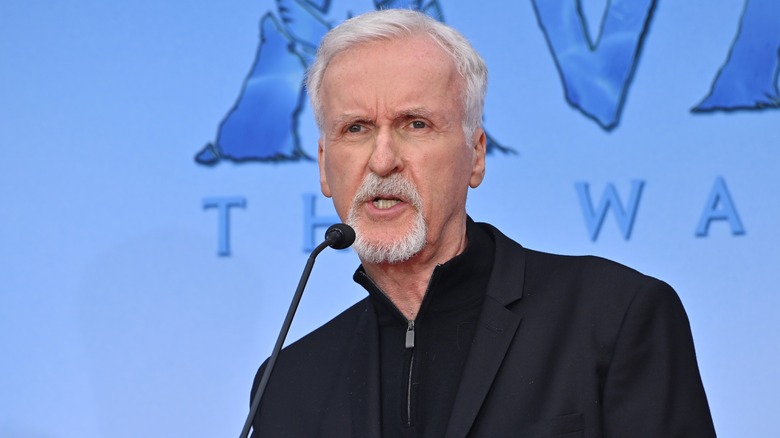The Ending Of Frailty Explained
"Frailty" is a dark thriller that verges into horror territory from 2001. The story packs in plenty of twists and gets great mileage out of the terrors of religion, as all of the numerous acts of violence within the film are carried out in the name of God. Whether or not the murders are a result of a man's sanity slipping or a genuine divine directive is the question at the heart of the movie.
The film also serves as the directorial debut of the late Bill Paxton, who also starred as the unnamed father who believes an angel has given him a deadly mission from God. Paxton had previously co-directed an episode of "Saturday Night Live" and the music video for the song "Fish Heads" by Barnes & Barnes, which he also starred in at the very start of his career, but "Frailty" was his first solo, feature-length outing as a director. While it failed to become a box office hit, "Frailty" grew into something of a cult classic.
Although in a 2010 interview with Big Fan Boy, Paxton said, "I'm collaborating with ['Frailty' screenwriter Brent Hanley] again. He's adapting a Joe Lansdale book called 'The Bottoms'," that project never came to fruition, and neither managed to rekindle the lightning-in-a-bottle of "Frailty" again. But that doesn't take away from the fascinating conclusion of the thriller — here's everything you need to know about how it ends.
What you need to remember about the plot of Frailty
Back in 1979, two young brothers, Adam (Jeremy Sumpter) and Fenton (Matt O'Leary), find their summer break fraught with violence after their father (Bill Paxton) claims to have been visited by an angel sent by God. He tells his sons that the angel gave him a list of names of people who are actually demons disguised as humans. When he touches the people from the list, he sees flashes of their heinous crimes, and his mission is to abduct and eradicate them all with a silver ax named Otis.
Meanwhile, in the present day, a man claiming to be the grown-up Fenton (Matthew McConaughey) heads into the FBI headquarters to tell Agent Wesley Doyle (Powers Boothe) that his brother Adam was the serial killer they have been hunting known as the God's Hand Killer. He explains that he couldn't turn his brother in while he was alive, but now that he has died by suicide, he is ready to come out with the truth and lead Agent Doyle to the garden where his brother buried all of his victims.
Tracking the timelines
The film opens in the present day, circa 2000 or 2001. This timeline serves as a framing device throughout the story that the film periodically returns to as Agent Doyle questions the man claiming to be Fenton Meiks, later driving him to the garden where he expects to find the buried victims of the God's Hand Killer.
Until the last act, the bulk of the narrative takes place in 1979, when Fenton and Adam Meiks were children living with their single father, who remains unnamed throughout the film. Tracking the two timelines, at first, seems rather straightforward. Each timeline utilizes a completely different cast, and the 1979 segment plays out over the course of several weeks, while the modern-day timeline takes place mostly over a single day and night. However, the timelines are secretly a bit trickier than they appear on the surface. The film's big plot twist only works because of the way the split timelines misdirect the audience and lead them into making incorrect assumptions about the man claiming to be Fenton Meiks. Setting the two timelines so far apart allows the film to get away with swapping the brothers without the casting raising any eyebrows. Most viewers are likely to believe everything that fake Fenton says, but they are unknowingly falling right into screenwriter Brent Hanley's trap.
The brotherly swap
In the flashforward framing device, Matthew McConaughey plays the adult version of Fenton Meiks — or at least, that's what viewers are led to believe. In a plot twist switcheroo, it turns out that he is actually Adam Meiks pretending to be his brother Fenton. It is important to remember that in the 1979 portion of the story, Adam is the one who is closer to their father and believes in his mission from God, whereas Fenton doubts his father's sanity and believes the abducted people from the list to be innocent victims.
As an adult, Adam serves as something of an unreliable narrator for the film. Before the twist is revealed, everything he tells Agent Doyle could easily be true, but after his deception becomes clear, it casts every detail he has fed the FBI agent into question. Adam's reason for taking over his brother's identity is to take suspicion off of himself and the murders he has committed while following in his father's footsteps. The real Fenton Meiks is dead, just like Adam said, except his cause of death was not suicide, but rather murder at the hands of his own brother. After Doyle learns of Adam's true identity and his malicious motivations, he tells Adam that the FBI will go after him. Adam responds by saying, "No they won't. They'll keep looking for Fenton. You're gonna be his last victim." In the end, Adam is correct.
What happened at the end of Frailty?
In essence, "Frailty" has two different endings: One for the 1979 storyline and one for the present-day storyline. The 1979 storyline comes to a head when the father attempts to force young Fenton to carry out one of the killings himself with the silver ax. The father says that Fenton is on the list of demons that he is meant to kill, but he instead hopes Fenton can save his soul by participating directly in the violent eradication of other demons. Instead of executing their captive, Fenton kills his own father. He attempts to help the captive escape, but the father uses his dying breath to whisper to Adam, who then murders the fleeing captive with the ax. The brothers are not violent toward each other at that moment, but there is an understanding between them that Adam may find himself compelled to kill Fenton eventually, as one of the names on the list of demons provided by the angel. Adam promises to bury Fenton in the garden if it ever comes to that.
In the present-day storyline, Agent Doyle eventually comes to understand that the man he has traveled to the garden with is not Fenton Meiks, but Adam Meiks instead. Adam did eventually carry through with the slaying of his own brother and has now assumed his identity. After finishing off the list of demons, Adam leaves Fenton as his fall guy.
What the end of Frailty means
The ending of "Frailty" means a few different things simultaneously. It means that the dad wasn't as unhinged as he appeared throughout the entire preceding film, and it changes how both brothers are perceived in retrospect since none of the information provided by adult Adam in the present day can be trusted. It also completely recontextualizes how you view the events of the film on a second watch, likely recoloring your allegiances to each of the main characters.
More than anything else, "Frailty" is a film that knows exactly how to capitalize on the assumptions that the audience can be counted on to make. In the simplest terms, everything that seems wrong about the 1979 storyline is actually right, and everything that seems right about the modern-day storyline is actually wrong. "Frailty" spells out the entire supernatural twist about the father's killings in explicit detail near the start of the film but banks on the fact that it seems too far-fetched to be believed. At the same time, adult Adam's ruse is so innocuous that viewers have no reason to even consider the possibility that he might be lying. By keeping a tight grip on assumptions, "Frailty" nails two twists at once by subverting expectations on both counts.
Dad wasn't crazy
Throughout the vast majority of "Frailty," the father's sanity is constantly in question. The story is told from the perspective of his sons, who suddenly have their entire world upended when their father declares that their lives are now dedicated to destroying demons disguised as humans. Throughout most of the film, the father's mental state is left ambiguous. For all of his wild, supernatural claims of being visited by an angel and whatnot, his only evidence is anecdotal, and the film never provides any objective proof ... until the very closing moments of the film, long after the father's death. The final scene of "Frailty" proves beyond a shadow of a doubt that everything he said was true.
Some viewers may believe in the veracity of the father's mission from God right off the bat, but most are more likely to fear his unhinged actions as he abducts and murders seemingly innocent people. The most important thing to keep in mind in this regard is that the two brothers were split on whether or not they believed their father. Adam trusted in his father completely, while Fenton doubted everything they were doing and eventually turned on his father to do what he thought was right. In response to his doubts, the father revealed that Fenton's name was on his list of demons disguised as humans. He couldn't bring himself to kill his son, but Fenton eventually killed his father and ended up committing the heinous acts predicted of him later in life.
Both brothers were killers
One of the more confusing parts of the twist-packed ending of "Frailty," and a detail that might get lost in the shuffle, is the knowledge that Adam and Fenton Meiks both murdered someone in their childhood and both continued killing after they grew up. At face value, the twist reveals that Adam has been pretending to be Fenton to pin his murders on his brother, which seems to absolve Fenton of wrongdoing, but this does not actually mean that Fenton was innocent.
The tricky thing to grasp is that both brothers committed many murders in their adulthood. Their actions were not related to each other, and one's killings can be labeled as evil while the other's killings can be labeled as righteous and for the greater good. The real Fenton truly was the God's Hand Killer and was responsible for all of the murders that the FBI was aware of. Meanwhile, Adam's victims were never found by the FBI. His murders were all carried out in the name of God as he followed in his father's footsteps and continued killing the people from the angel's list.
Fenton growing up to become a serial killer of random, innocent people can be taken as a result of his disturbed childhood or as proof that he really was a demon disguised as a human, as the angel told his father all those years ago. Adam did eventually kill his brother and put an end to his serial killing, and he delivered on his promise to bury him in the garden.
Agent Doyle's dark secret
From the beginning of "Frailty" and throughout much of its runtime, Wesley Doyle seems like a completely normal FBI agent seeking the truth and attempting to stop a serial killer. While Agent Doyle and adult Adam (who still claims to be Fenton at this point) make the long drive to the garden, Doyle tells the story of how his mother was murdered and her killer was never caught. At first, this seems like it may have been part of his motivation to hunt killers for the FBI, but the truth comes out in the end.
Right after Adam reveals his true identity, he also reveals that Wesley Doyle is the final name on his list of demons to destroy. When he touches Agent Doyle's face, he sees visions of his crime, just like his father always had when touching the abducted targets without his gloves. Flashes of Agent Doyle stabbing his own mother to death fill Adam's mind, and Doyle confirms the crimes by wondering aloud how Adam could have possibly known about that. Agent Doyle's admission is important because all of the other demons eradicated by the father maintained their innocence to the bitter end. The visions seen by the father could have been taken as part of his delusions, but there is no longer any ambiguity once Agent Doyle's guilt becomes clear. Before he kills him, Adam tells Agent Doyle, "You didn't think anybody knew about that, did you? God knew. That's why he sent me."
Divine Intervention
Any ambiguity remaining around the mission from God is fully stripped away by the film's final scene. Right before Adam kills Doyle with Otis the ax, he tells Adam that his plan to pin his murder on Fenton won't work, because other FBI agents saw him up close and personal. Despite spending hours inside the FBI headquarters, Adam isn't worried about getting caught in the slightest. He tells Agent Doyle, "God will protect me."
This turns out to be true, as Adam's plan to frame Fenton for all his murders goes off without a hitch. In the film's closing sequence, all of the agents who interacted with Adam in the FBI headquarters find themselves struck with unnatural partial amnesia and are unable to recall what he looked like. Agent Hull (Derk Cheetwood) says, "It's just a blur. I can't understand it. I looked right at him, I shook his hand." The divine intervention extends further to the security cameras that recorded Adam inside the FBI headquarters. When the agents play back the tapes, they find that the footage has a bizarre row of static that hides Adam's face and even follows him across the screen as he moves, keeping his appearance a complete mystery.
These two unnatural occurrences prove 100% that Adam and his father were both right, and that God is behind the mission to eradicate demons. When the FBI storms into Fenton's home, a boatload of incriminating evidence is there waiting for them to seal the deal on Fenton's culpability as the murderer.
The alternate ending created by a famous filmmaker
"Frailty" has only one official ending, but there was a different ending that was shot and edited together before getting scrapped ahead of the film's release. The ending that was originally planned is actually the one that wound up on the cutting room floor, while the last-minute alternate ending became the official ending instead. Surprisingly, James Cameron was responsible for creating the new ending of "Frailty."
Cameron is only listed in the credits under the special thanks section, but he had a far more involved role in the film's post-production phase. As a frequent collaborator of Bill Paxton, Cameron came to check out the film and give his opinion as a favor. He liked the film, but had one big structure suggestion that would drastically shake up both the opening and ending of the film, and he got hands-on with the edit to prove why the change was so beneficial. In an interview with Bloody Disgusting, "Frailty" producer David Kirschner said of Cameron's involvement, "James had said 'I think you should move this from the end and move it to the beginning and I think that will make the end that much more succinct.' We weren't even clear what he was talking about neither Bill, or I, nor Arnie and he says, 'Can I just show you?' and boom. This guy is so brilliant and he does everything and he puts it together and we look at it and it changed the entire film." Kirschner didn't delve into details about what specifically Cameron changed or how the original opening and closing of the film unfolded, but it's clear that Cameron's quick re-edit was key to the overall structure of the film.
